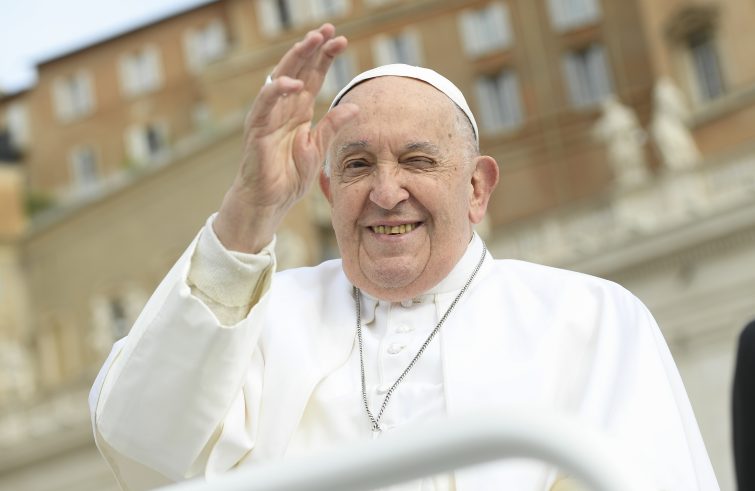
“Let us pray for definitive peace, and no more war.” Pope Francis made this appeal during his greetings to the Italian-speaking faithful, which are traditionally delivered at the end of the weekly general audience in Saint Peter’s Square. “Let us pray for peace,” the Pope said: “Let us not forget the martyred Ukraine, let us not forget Palestine, Israel, Myanmar.
Let us pray for peace, let us pray for all peoples suffering war. All together, with big hearts, let us pray for definitive peace, and no more war. Because war is always a defeat: always!”.
These words were preceded by an appeal to the international community to “immediately provide the necessary aid and assistance to protect the most vulnerable” in Afghanistan, which has been hit by floods that have claimed many lives, among them children. Charity, the third theological virtue and “the culmination of the entire itinerary we have undertaken with the catecheses on the virtues”, was at the heart of the catechesis.
“The Christians of Corinth were rather litigious, there were internal divisions, and there were those who claimed always to be right and did not listen to others, regarding them as inferior”,
Francis said: “Paul reminds them that knowledge puffs up, whereas charity builds up.” The Apostle “then records a scandal that touches even the moment of maximum union of a Christian community, the the Eucharistic celebration: even there, there are divisions, and there are those who take advantage of this to eat and drink, excluding those who have nothing.” “In the face of this, Paul gives a stark judgement,” the Pope observed: “When you meet together, it is not the Lord’s supper that you eat, you have another ritual, which is pagan, it is not the Lord’s supper.” “Who knows, perhaps in the community of Corinth, no-one thought they had committed a sin, and those harsh words of the Apostle sounded somewhat incomprehensible for them”, Francis remarked: “Probably they were all convinced they were good people, and if questioned on love, they would have answered that love was certainly a very important value for them, just like friendship or the family.”
“In our days too, love is on the lips of many “influencers” and in the refrains of many songs. We speak a lot about love, but what is love?”,
the Pope asked, pointing out that in the Letter to the Corinthians Paul asks his Christians about “the other love”: not the one that appears, but the one that is hidden. Paul is concerned that in Corinth – as among us today too – there is confusion and that there is actually no trace of the theological virtue of love, the one that comes to us only from God. And if even in words everyone assures that they are good people, that they love their family and friends, in reality they know very little about the love of God.”
“Christians are capable of all the forms of love in the world: they too fall in love, more or less as it happens to everyone”,
Francis said delving into the meaning of the word “agape”, which we normally translate as “charity”. “They too experience the benevolence that is felt in friendship”, ha continued: “They too feel love for their country and the universal love for all humanity.” “But there is a greater love, a love which comes from God and is directed towards God, which enables us to love God, to become His friends, and enables us to love our neighbour as God loves him or her, with the desire to share the friendship with God”, the Pope explained: “This love, because of Christ, drives us where humanly we would not go: it is the love for the poor, for those who are not lovable, for those who do not care for us and are not grateful. It is love for what no-one would love, even for one’s enemy. Even for the enemy. This is “theological”: this comes from God, it is the work of the Holy Spirit in us.”
“We are used to speaking badly of our enemies. Faced with an insult or a curse, we are accustomed to replying with another insult, with another curse”,
the Pope, said off-text, in remarks on the Sermon on the Mount. “Let us remember this: ‘Love your enemies and do good, and lend, expecting nothing in return”, Francis reminded the faithful. “We immediately realize that it is a difficult, indeed impossible love to practice if one does not live in God”, the Pope said: “Our human nature makes us love spontaneously what is good and beautiful. In the name of an ideal or a great affection we can even be generous and perform heroic acts. But the love of God goes beyond these criteria. Christian love embraces what is not lovable, it offers forgiveness – how difficult it is to forgive! How much love it takes to forgive! – Christian love blesses those who curse.” “It is a love so ardent that it seems almost impossible, and yet it is the only thing that will remain of us”, Francis assured: “Love is the “narrow gate” through which we will pass in order to enter the Kingdom of God. Because
at the twilight of life, we will not be judged on generic love; we will be judged precisely on charity, on the real love we had.”
“Truly, I say to you, as you did it to one of the least of these my brethren, you did it to me”, Jesus’ words. “This is the beautiful thing, the greatest thing about love”, the Pope said: “Onwards and upwards!”










